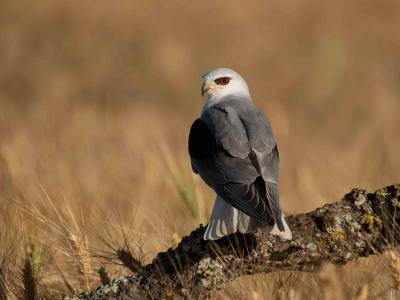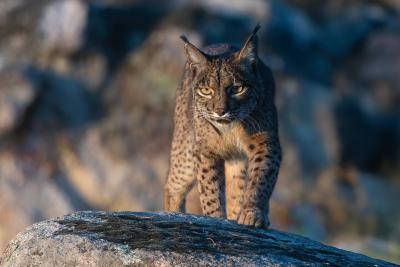Greece: Mainland Spring Migration
-
Apr 16-27, 2025
Steve Rooke
-
Apr 12-23, 2026
Oli Reville
2025
Single Room Supplement $290
2026
Tour Price to be Determined
2025
Single Room Supplement $290
2026
Tour Price to be Determined
Greece is sandwiched between the Ionian Sea to the west, Turkey and the Aegean Sea to the east, Mediterranean Sea to the south, and the countries of Albania, North Macedonia, and Bulgaria to the north. The maritime location and varied landscapes not only helped shape Greece’s history and culture but are, along with its location on the eastern European migration flyway, key reasons for its wide diversity of birds.
Our tour should witness bird migration at its peak and could include 20+ species of birds of prey including Eastern Imperial Eagle and Levant Sparrowhawk, Audouin’s Gull, and large numbers of passerines including multiple species of wheatears, warblers, and shrikes, among many others. We’ll also pay attention to the many reptiles, insects, amphibians, mammals, and flora which inhabit this wonderful country.
Day 1: Our tour will begin with a transfer from the Sofia, Bulgaria airport to Lake Kerkini, Greece, about two hours away. If time permits, we’ll take a short walk around the lake to get our first impressions of this scenic and bird rich area. Night at Lake Kerkini.
Days 2-3: We’ll explore Lake Kerkini and its surrounding areas. An optional pre breakfast walk should encounter Little Bittern, Penduline Tit, Great Reed Warbler, and, with luck, Little Crake, among others. After breakfast we’ll more fully explore the almost fifty square mile lake area and its adjacent habitats.
We’ll begin by investigating wet areas close to the Strymonos River. These habitats are full of birds, with highlights including Dalmatian and Great White Pelicans, all the European egrets and herons, Ferruginous Duck, and Black Stork. We should see as well multiple species of raptors including Pallid Harrier along with stunning passerines such as Eurasian Golden Oriole, Lesser Grey and Red-backed Shrikes, and Sardinian Warbler.
On day 2, we’ll take a boat trip on lake where our experienced local guide will get us close to the pelican colony found here, giving us wonderful views and good photographic opportunities. We’ll also visit lakehore riparian forests where colonial waterbird breeders include Squacco Heron, Pygmy Cormorant, Little Egret, and Eurasian Spoonbill.
In the afternoon we’ll drive to Belles Mountain where a different range of species awaits including Sombre Tit, Black-headed and Cirl Buntings, Woodchat Shrike, and Hawfinch. We’ll also explore an old quarry where Blue Rock Thrush, Eastern Black-eared Wheatear, and Western Rock Nuthatch can usually be found. Our final birding around Lake Kerkini will be near the town of Siderocastro whose picturesque hillsides support Masked Shrike, Short-toed Snake Eagle, and Olive-tree and the striking Eastern Subalpine Warblers. Nights in Lake Kerkini.
Days 4-6: We’ll transfer east to the vicinity of Nestos National Park, a journey of around three hours. En route we’ll stop at good birding locations, one of which will hopefully bring us face to face with one of the top targets of the tour, Spur-winged Lapwing. The coastal area near the Nestos River valley is as well home to a wide range of terns and gulls, including the elegant Slender-billed Gull.
The next day we’ll explore the south face of the Rhodopes Mountains along the Nestos River gorge. In this arresting location we’ll look for Sardinian Warbler, Woodlark, Northern Wheatear (of the localised Balkan subspecies), Crag Martin, and Griffon Vulture. We’ll also search for one of Europe’s most elusive birds, Rock Partridge.
On our last day we’ll explore the coastline around Porto Lagos, a wonderful wetland landscape with huge flocks of shorebirds, gulls, and terns. Out to sea we may observe passing seabirds such as Yelkouan Shearwater, while in the lakes and shallow lagoons nearby, we should encounter groups of Greater Flamingo. We also stand a good chance of seeing Collared Pratincole. Nights in Fanari.
Days 7-8: We’ll travel east to the Dadya Forest, a natural area of mostly pine and oak which hosts the only breeding colony of Cinereous Vulture in the Balkan region. We’ll visit a vulture feeding center, where from a blind we can observe these amazing birds at close quarters. The feeding center also attracts many other birds of prey and great views can be had of Black Kite, Long-legged Buzzard, and White-tailed and Eastern Imperial Eagles. We’ll spend the balance of the day in other parts of the Dadia-Lefkimi-Soufli National Park where a range of woodland and forest species can be found.
We’ll dedicate our next day to the Evros Delta, on the Greek border with Turkey and one of Europe’s largest wetlands. We’ll have special permits and guides which grant us access to zones normally off limits. Spectacular birding is possible here with thousands of shorebirds, waterfowl, gulls, and terns on offer as is Europe’s only stable breeding population of Spur-winged Lapwing. Other species include Ruddy Shelduck, Lesser Spotted Eagle, Red-footed Falcon, European Roller, Red-throated Pipit, Great Spotted Cuckoo, Eastern Orphean Warbler, and Isabelline Wheatear. Nights in Dadya Forest.
Days 9-10: We’ll begin our journey back to Thessaloniki and explore the wonderful landscapes around the village of Maroneia. The habitat here could includin Barred Warbler, Ortolan Bunting, Alpine Swift, Tawny Pipit, Eurasian Wryneck, Collared and Semicollared Flycatchers, and Syrian Woodpecker. We’ll also search for the impressive Eurasian Eagle-Owl.
On the following day we’ll explore more of this arresting habitat with Rufous-tailed Scrub Robin being a prime target. As we move close to the sea, we’ll once again scan for passing seabirds like Yelkouan and Scopoli’s Shearwaters, and Audouin’s Gull. Nights in Maroneia.
Day 11: We'll spend the day along the Aegean coast before turning inland for our three hour drive back to Sofia, Bulgaria, where our final night of lodging (and a well-deserved final dinner!) awaits. Night in Sofia, Bulgaria.
Day 12: The tour concludes this morning in Sofia, Bulgaria with flights home.
Note: The information presented below has been extracted from our formal General Information for this tour. It covers topics we feel potential registrants may wish to consider before booking space. The complete General Information for this tour will be sent to all tour registrants and of course supplemental information, if needed, is available from the WINGS office.
ENTERING GREECE: United States citizens will need a passport valid for at least six months beyond your intended date of departure and with at least one blank page for an entry stamp. No visa is required for tourist visits of fewer than 90 days in a 180-day period.
Citizens of other nations should contact the nearest Greek Consulate for entry requirements.
It is always a good idea to take photocopies of your passport and air ticket with you when traveling abroad. They can prove invaluable in helping you get replacements if your original documents are lost or stolen. You should pack the photocopies separately from the originals.
COUNTRY INFORMATION: You can review the U.S. Department of State Country Specific Travel Information at https://travel.state.gov/content/travel/en/international-travel/International-Travel-Country-Information-Pages/Greece.html, and the CIA World Factbook background notes on Greece at https://www.cia.gov/the-world-factbook/countries/greece/.
Review foreign travel advice from the UK government here: https://www.gov.uk/foreign-travel-advice and travel advice and advisories from the Government of Canada here: https://travel.gc.ca/travelling/advisories
PACE OF TOUR: Some days will start with an optional pre-breakfast excursion which will last between one and two hours. After breakfast we will usually head out for the day. Some days we will spend one night in a hotel so please have your luggage ready to go with us after breakfast. Provided the weather is fine, we’ll have a picnic lunch. Some days we may return to the hotel for a break in the afternoon, but generally we’ll be out birding until about an hour before dinner, the time of which will vary depending on our itinerary.
The tour is not strenuous and is designed to be taken at a relaxed pace. However, in a couple of places we will walk on stony ground and up rocky valleys. Leisurely walks of up to 1 or 2km over easy terrain will be all that is required.
HEALTH: The Centers for Disease Control and Prevention (CDC) recommends that all travelers be up to date on routine vaccinations. These include measles-mumps-rubella (MMR) vaccine, diphtheria-tetanus-pertussis vaccine, varicella (chickenpox) vaccine, polio vaccine, and your yearly flu shot.
They further recommend that most travelers have protection against Hepatitis A while Hepatitis B is recommended. Please contact your doctor well in advance of your tour’s departure as some medications must be initiated weeks before the period of possible exposure. The most current information about travelers’ health recommendations can be found on the CDC’s Travel Health website at https://wwwnc.cdc.gov/travel/destinations/traveler/none/greece.
Smoking: Smoking or vaping is prohibited in the vehicles or when the group is gathered for meals, checklists, etc. While in the field or traveling, use of a smokeless alternative such as nicotine gum is requested. Please do not smoke at short stops while traveling. If you smoke in the field, do so well away and downwind from the group and leave ample time between smoking and getting back into the vehicle. If you are sharing a room with a non-smoker, please do not smoke in the room. If any lodge, accommodation or location where the group is staying or is gathered has a more restrictive smoking policy than WINGS’ policy, the more restrictive policy will prevail. The leader reserves the right to modify this policy if the situation warrants it.
Miscellaneous: Insects shouldn’t be too much of a nuisance during our tour. It is worth checking yourself after walking in long grass in case of ticks.
CLIMATE: It is generally warm and pleasant in April with temperatures ranging between 17°C (62.6°F) and 23°C (73.4°F) in the daytime, but cooler in the early morning and evenings. The weather is usually stable during April but rain could occur.
ACCOMMODATION: Throughout the tour we will be staying at comfortable, good quality hotels.. All rooms have a private bathroom with a shower. Hairdryers not provided, bring your own if you think you need one.
There may be nice (outdoor) swimming pools at a couple of the hotels, and guests are welcome to use them, but we are seldom if ever at the hotel at a time of the day when the temperature is conducive to swimming.
Internet and Mobile Phone Access: Our hotels have reasonably good Wi-Fi connection, and guests can use this on their own devices free of charge. Mobile phone access is very good throughout most of Greece.
FOOD: Meals at all our hotels will be plentiful with a variety of local foods. Our picnic lunches will also consist of local meats, cheeses, salads, and breads. Each evening we will have a meal at our hotel or a local restaurant nearby. Vegetarians are well catered for.
WINGS tours are all-inclusive, and no refunds can be issued for any tour meals participants choose to skip.
Food Allergies/Requirements: We cannot guarantee that all food allergies can be accommodated at every destination. Participants with significant food allergies or special dietary requirements should bring appropriate foods with them for those times when their needs cannot be met. Announced mealtimes are always approximate depending on how the day unfolds. Participants who need to eat according to a fixed schedule should bring supplemental food. Please contact the WINGS office if you have any questions.
Drinks: All beverages are not included with meals and will have to be paid for by the tour participant. We always keep a supply of bottled water on the tour vehicles.
TRANSPORTATION: Transportation will be in minibuses driven by the leaders. Bottled water is provided on the minibuses. The leader will arrange a seating rotation. Participants must be willing and able to ride in any seat in our tour vehicles.
This tour is limited to 10 participants with two leaders.

























